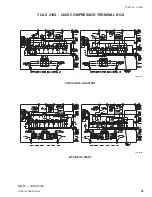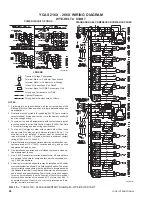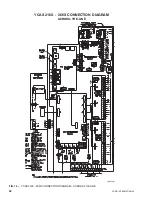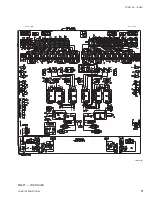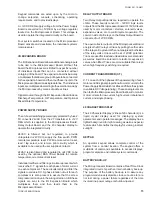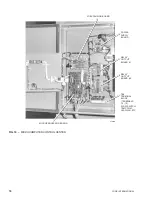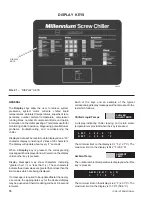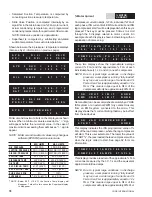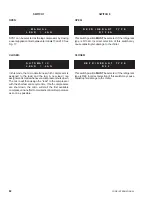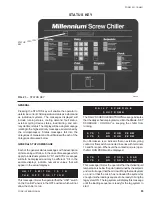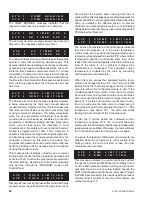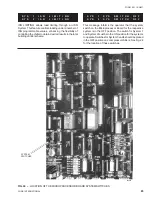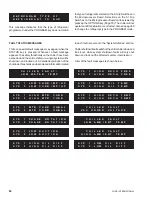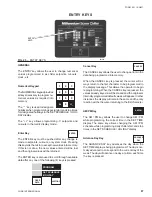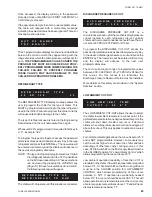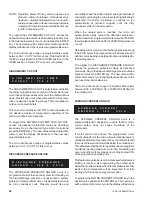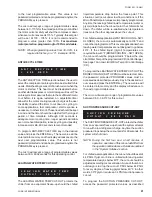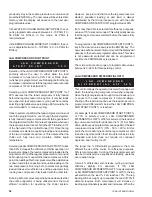
FORM 201.10-NM1
77
YORK INTERNATIONAL
System 1
Pressures / Temperatures
Oil pressure, suction pressure, discharge pressure,
suction temperature*, discharge temperature, oil tem-
perature, saturated discharge temperature, saturated
suction temperature, slide valve position and superheat
on System 1 will be displayed when this key is repetitively
pressed. The key must be pressed 6 times to scroll
through the 6 displays required to display these operating
parameters.
Temperatures and pressures may be measured directly
by transducers and temperature sensors. Others are
computed from these measurements:
• Differential oil pressure is measured by subtracting oil
pressure measured by a transducer located in the oil
line after the oil filter from the discharge pressure. (Oil
in the oil separator is at discharge pressure.)
Ideally, oil injected after the filter, is at discharge
pressure. This makes ideal differential oil pressure 0
PSID. However, a pressure drop occurs across the oil
filter. Typically, the drop will be 0 - 10 PSID. As the filter
becomes clogged, oil pressure will eventually rise
above 40 PSID.
• Saturated Discharge Temperature is computed by
converting discharge pressure to temperature.
• Saturated Suction Temperature is computed by
converting suction pressure to temperature.
• Slide Valve Position is computed internally by an
algorithm in the micro based on average % FLA motor
current, programmed motor current equal to 100%
FLA, actual condensing temperature, programmed
condensing temperature for a particular chiller model,
and the number of load pulses sent by the micro.
NOTE: Slide valve position is approximate and should
be used for reference only.
• Superheat is computed by subtracting saturated suc-
tion temperature from suction temperature.
Shown below are the 6 pressure / temperature displays:
Minimum and maximum limits or values on the displays
are shown below. When a minimum limit or value is
exceeded, a “ < “ sign will appear before the numerical
value. In the case of maximum limits or values,
exceeding them will cause a “ > ” sign to appear.
NOTE: Minimum and maximum values may change as
software (EPROM) revisions are made.
SYSTEM 1
PRESS / TEMP
MIN. LIMITS
MAX. LIMITS
OIL PRESSURE
208 PSID
0 PSID (O BARD)
SUCTION PRESSURE
0 PSIG (O BAR G) 199 PSIG (13.7 BAR G)
DISCHG. PRESSURE
0 PSIG (O BAR G) 399 PSIG (27.5 BAR G)
SUCTION TEMP.
*9.0°F (-12.8°C)
84.2°F (29.0°C)
DISCHARGE TEMP.
40.3°F (4.6°C)
302.6°F (150.3°C)
OIL TEMP.
40.3°F (4.6°C)
240.0°F (115.6°C)
SAT. DISCHG. TEMP.
-41.0°F (-40.6°C)
140.5°F (60.3°C)
SAT. SUCTION TEMP.
-41.0°F (-40.6°C)
101.3°F (38.5°C)
SLIDE VALVE POS
0%
100%
SUPERHEAT
*-81.5°F (-63.1°C)
60.9°F (16.1°C)
* NOTE: Below 9.0°F (-12.8°C), the Suction Temp. display will
disappear. This will in turn cause the Superheat display to
disappear.
System 2
Pressures / Temperature
Oil pressure, suction pressure, discharge pressure,
suction temperature**, discharge temperature, oil
temperature, saturated discharge temperature, saturated
suction temperature, slide valve position, and superheat
on system 2 will be displayed when this key is pressed.
The key must be pressed 6 times to scroll through the 6
displays required to display these operating parameters.
Temperatures and pressures may be measured directly
by transducers and temperature sensors. Others are
computed from these measurements:
• Differential oil pressure is measured by a subtracting
oil pressure measured by a transducer located in the oil
line after the filter, from the discharge pressure. (Oil in
the oil separator is at discharge pressure.)
Ideally, oil injected after the filter, is at discharge
pressure. This makes ideal differential oil pressure 0
PSID. However, a pressure drop occurs across the oil
filter. Typically, the drop will be 0 - 10 PSID. As the filter
becomes clogged, oil pressure will eventually rise
above 40 PSID.
• Saturated Discharge Temperature is computed by
converting discharge pressure to temperature.
SYSTEM 2
PRESS/TEMP
S Y S
1
O I L =
5 0
P S I D
S P =
5 5
D P =
2 4 8
P S I G
S Y S
1
S U C
=
3 6 . 2
° F
D S C H
=
1 2 1 . 2
° F
O I L
T E M P 1
=
7 7 . 9
° F
S A T
D I S H 1
=
1 3 0 . 0
° F
S A T
S U C T 1
=
2 4 . 3
° F
S Y S # 1
S U P E R H E A T
=
1 2 . 2
° F
S Y S
1
S L I D E
V A L V E
P O S I T I O N
=
1 0 0 %
Summary of Contents for Millennium YCAS 216X
Page 11: ...FORM 201 10 NM1 11 YORK INTERNATIONAL YCAS 140 246 DIMENSIONS English LD01444 LD01446...
Page 13: ...FORM 201 10 NM1 13 YORK INTERNATIONAL YCAS 140 246 DIMENSIONS SI LD01440 LD01442...
Page 15: ...FORM 201 10 NM1 15 YORK INTERNATIONAL YCAS 216X 266X DIMENSIONS English LD01454 LD01454...
Page 17: ...FORM 201 10 NM1 17 YORK INTERNATIONAL YCAS 216X 266X DIMENSIONS SI LD01450 LD01448...
Page 33: ...FORM 201 10 NM1 33 YORK INTERNATIONAL 28514A FILTER DRYER LIQUID STOP VALVE...
Page 37: ...FORM 201 10 NM1 37 YORK INTERNATIONAL LD01285 FIG 3 SCREW CHILLER REFIGERANT FLOW DIAGRAM...
Page 59: ...FORM 201 10 NM1 59 YORK INTERNATIONAL FIG 11 CONTINUED LD01465 D...
Page 61: ...FORM 201 10 NM1 61 YORK INTERNATIONAL FIG 12 CONTINUED LD01458 D...
Page 69: ...FORM 201 10 NM1 69 YORK INTERNATIONAL FIG 16 CONTINUED LD01206 D...
Page 71: ...FORM 201 10 NM1 71 YORK INTERNATIONAL FIG 17 CONTINUED LD01202 D...



